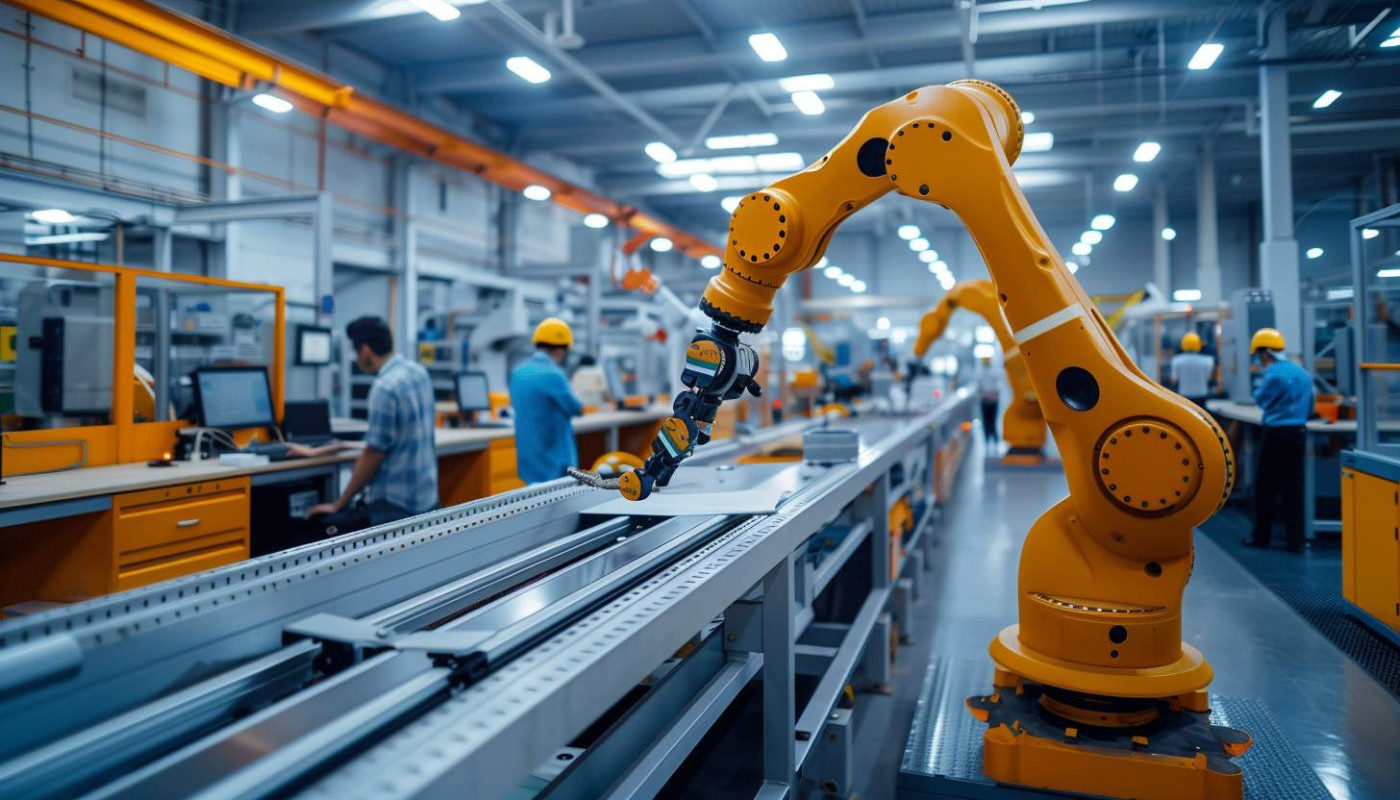Table of contents
The advent of reactive artificial intelligence (AI) is radically transforming the landscape of modern industries, creating a paradigm shift in the way businesses operate and interact with their customers. From streamlining operations to providing unparalleled customer experiences, reactive AI is at the forefront of innovation. This exploration dives into the multifaceted impacts of this technological marvel, illuminating the ways in which it is reshaping the industrial horizon. Embark on a journey to understand the profound implications of reactive AI and how it is becoming an indispensable tool for businesses aiming to thrive in the digital age.
The Evolution of Industry with Reactive AI
The emergence of reactive AI development has marked a significant shift in the way industries operate. Initially, this form of artificial intelligence was programmed to execute basic automated responses, laying the groundwork for the broader concept of industry automation. Over time, adaptive AI systems have grown increasingly sophisticated, incorporating advanced algorithms capable of machine learning. This progression has enabled AI to not only respond to pre-programmed scenarios but also to perceive and adapt to unforeseen changes in the environment, a leap that has profoundly influenced AI integration across various sectors.
As industries have embraced AI-driven innovation, the role of reactive AI has expanded dramatically. From manufacturing to healthcare, finance to customer service, the technology has been fine-tuned to meet the specific needs of each sector. Today's reactive AI systems are equipped with nuanced understanding and can make real-time decisions that mirror human problem-solving abilities. Their ability to constantly learn and improve from each interaction or data point ensures that industry processes become more efficient, less error-prone, and highly personalized to individual user requirements. Thus, the history of reactive AI mirrors the trajectory of technological revolution within modern industries, setting the stage for a future where AI partners seamlessly with human intuition and creativity.
In crafting a comprehensive account of this evolution, we call upon the authoritative insights of the industry's leading AI expert. Such an expert would provide a nuanced analysis of the key milestones in reactive AI development and its impact on industry automation. Their knowledge would illuminate the intricacies of adaptive AI systems and the various challenges and successes in AI integration. Ultimately, their perspective would not only chronicle the journey of reactive AI but also forecast the burgeoning innovations poised to redefine the industrial landscape.
Enhancing Productivity and Efficiency
In the current industrial landscape, reactive AI stands as a pivotal force in amplifying productivity and sharpening efficiency. By integrating predictive maintenance, industries benefit from proactive approaches to machinery and system upkeep, drastically reducing downtimes and extending the lifecycle of equipment. Sophisticated AI algorithms analyze historical data to forecast potential breakdowns, enabling preemptive action that ensures continuous operational flow and preserves capital investments.
Supply chain optimization is another arena where reactive AI demonstrates substantial impact. AI systems dynamically adjust to market demands, manage inventory levels, and optimize routing and logistics. The result is a leaner, more responsive supply chain, characterized by reduced waste, cost savings, and improved delivery times. The incorporation of real-time data analytics into these processes further empowers businesses, allowing data-driven decision-making that swiftly adapts to changing scenarios, thereby enhancing AI efficiency.
Furthermore, AI productivity enhancements are evident in the realm of real-time data analytics. Industries leverage this capability to process and interpret vast streams of information instantaneously, transforming raw data into actionable insights. Whether it's monitoring production lines, tracking customer behavior, or analyzing market trends, reactive AI equips industry leaders with the tools to make informed, strategic decisions that foster growth and competitiveness.
Challenges and Ethical Considerations
The integration of reactive AI within various sectors brings with it a myriad of challenges and ethical considerations that necessitate careful scrutiny. Chief among these is the issue of AI privacy concerns, with the potential for these systems to inadvertently breach confidentiality or misuse data, raising alarms across the board. As AI systems become more prevalent, the risk of AI job displacement looms large, provoking dialogue about the future of employment and the need for workforce adaptation strategies. Meanwhile, the call for AI transparency grows louder, advocating for clear visibility into AI decision-making processes to ensure they are free from bias and can be trusted by users.
Significant too is the imperative of responsible AI deployment, which involves creating AI solutions that not only drive innovation and efficiency but also align with societal values and norms. The development of comprehensive AI ethical guidelines is paramount in this regard, serving as a north star for developers and users alike. These guidelines should address the necessity of bias mitigation, a technical term that refers to efforts in reducing the potential for AI to reflect or amplify prejudices present in their training data or design.
The insights of AI ethicists and regulatory compliance experts are integral in navigating these complex issues. They provide authoritative perspectives on the conception and enforcement of ethical standards, ensuring that the profound impact of reactive AI on modern industries is both positive and equitable. Through their guidance, the balance between harnessing AI's potential and upholding ethical principles can be achieved, fostering trust and sustainability in AI-driven advancements.
Future Outlook and Innovations
As autonomous systems continue to evolve, the landscape of modern industries is poised for a significant transformation. A futurist specializing in technological trends would likely predict that the AI workforce impact will be profound, with reactive AI not only automating routine tasks but also reshaping job roles, spurring the need for new skill sets and retraining programs. The disruption in the labor market may lead to a redefinition of work itself, as AI becomes an integral partner in human endeavors.
The AI economic potential is vast, with possibilities ranging from streamlined operations to novel revenue streams. Industries are starting to harness the predictive capabilities of reactive AI to drive efficiency, enhance customer experiences, and reduce operational costs. This technology's contribution to the economy could be measured in trillions, as businesses that successfully integrate reactive AI stand to gain a competitive edge in the global market.
On a broader scale, the AI societal impact is expected to be just as transformative. The integration of reactive AI in everyday life could lead to smarter cities, advanced healthcare diagnostics, and personalized education systems. Yet, this comes with ethical considerations surrounding privacy, security, and the digital divide, prompting a need for robust policy frameworks to ensure equitable benefits from AI advancements.
The future also holds promise for AI learning advancements. Reactive AI systems are anticipated to become more adaptive, learning from interactions with humans and the environment to improve their responses. This ability to learn from experience will further blur the lines between automated responses and human-like decision-making, opening new avenues for AI applications.
Furthermore, cross-industry AI collaboration is likely to be a mainstay, as companies recognize the value in sharing insights and technologies. Such partnerships could lead to innovative solutions to complex challenges, transcending the boundaries of single industries. As these autonomous systems grow more interconnected and capable, they could facilitate unprecedented levels of collaboration, driving progress in fields as diverse as environmental science, finance, and public safety.
In light of these projections, it's clear that reactive AI is not just a fleeting trend but a foundational shift that will permeate the fabric of industries and society. The precise trajectory of this evolution remains to be shaped by ongoing research, development, and the collective decisions of stakeholders worldwide.
Transforming Customer Interactions
In the realm of customer service, reactive AI is a game-changer, bringing forth a new era of AI customer service. By harnessing the power of personalized AI interaction, businesses are now able to offer their customers highly tailored experiences. This shift is evident in the swift AI problem resolution capabilities that are reshaping consumer expectations. No longer is it acceptable to wait in long queues or navigate labyrinthine phone menus; AI chatbots equipped with sophisticated natural language processing algorithms can understand and resolve customer inquiries in real time.
The role of reactive AI in customer relationship management is multifaceted. It extends beyond mere transactional interactions to fostering a deep, continuous relationship with the consumer. This bond is built on the understanding and anticipation of customer needs, enabled by AI's ability to learn and adapt from each interaction. As a result, businesses that invest in AI chatbots and reactive AI systems are often rewarded with increased customer loyalty and satisfaction.
For those seeking to delve deeper into the various types of AI and their applications across industries, a recommended site is an invaluable resource. It provides a comprehensive overview that can enhance one's understanding of how reactive AI continues to influence modern business practices.
Similar articles










